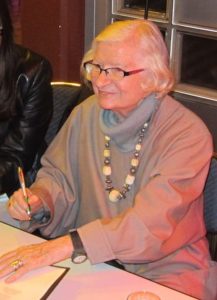P.D. James is one of my favorite authors whose British style is both elegant and extremely clever. She mastered the art of the detective story and created her famous detective Adam Dalgliesh, who likewise is both elegant and extremely clever.
About 20 years ago when she had just turned 77, she began writing in a diary for a year and took its title from Samuel Johnson’s famous quote when he was 77 – “It is a time to be in earnest.” Being in earnest is not simply being truthful and sincere but also being forward-looking, embracing what is most important.
I normally would not find interesting a diary that that recounts events of a given day, includes stream-of- consciousness glimpses of childhood memories, details elements that go into the developing of a detective story, and provides commentaries on life in general, important virtues and whatever else comes to mind. Yet, I thoroughly enjoyed this diary and read it with the same fervor that I approach so many of her mystery novels that are hard to put down.
I fear that reading is becoming a lost art. With iPhones that allow for movies and sitcoms, podcasts that cover virtually every topic, and ubiquitous music whose goal is to block out the world, reading a book allows one to enter a world of imagination and creativity in a unique way. Unlike a movie that keeps moving on whether you are ready or not, a book is an occasion to experience life at one’s own pace.
Reading a book out loud also uncovers a special experience. I am told that children are especially responsive to someone who reads to them. I find myself often sharing with a friend a paragraph that is especially cleverly written. Whereas movies or sports events tend to be experienced as a spectator, reading a book requires participation and, if read aloud, shared participation.
I have been thinking a lot about participation because the pandemic has moved us as a Church into virtual reality for a time. As comfortable as it is to watch an event on television or on the Internet –which also is well suited for our penchant to take the easy path – there is a trap that the participation becomes quite limited. At Mass, the Word of God is not simply read privately but it is proclaimed or read aloud. The words of Consecration, “This is My Body, This is My Blood,” are pronounced aloud so that all who are present participate in the mystery rather than being distant spectators, looking, as it were, from the outside in.
In the coming weeks, we will seek to return to face-to-face participation at Mass in a safe and prudent way. Of course, personal health limitations and the limitations of what is safe for public assemblies will have a great effect on our return. When the pandemic lifts and we all can begin to gather again for the celebration of the Holy Eucharist, we will have the opportunity to come together in earnest. Just as P.D. James sought to share her life through her 78th year in diary form, in an infinitely more sacrificial and self-giving manner, Jesus Christ becomes present to us and through us, His community, in the one sacrifice of the Holy Eucharist. The word “eucharist” means “thanksgiving,” and so we yearn not simply to be earnest but to be grateful as we gather once again.
To see my letter to the faithful and plan for reopening churches that are able to do so safely, please go to www.archlou.org/COVID-19.




